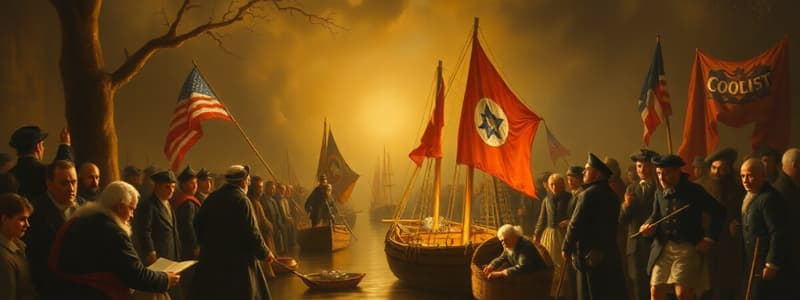Podcast
Questions and Answers
What was the primary reason colonists opposed British taxes?
What was the primary reason colonists opposed British taxes?
- They sought independence from all British influence.
- They believed they should only be taxed by their own assemblies. (correct)
- They were against trade regulations.
- They wanted access to British markets.
Which event directly led to the passing of the Intolerable Acts?
Which event directly led to the passing of the Intolerable Acts?
- The Boston Tea Party (correct)
- The Boston Massacre
- The Stamp Act Congress
- The Declaration of Independence
What was a key outcome of the French and Indian War for the British government?
What was a key outcome of the French and Indian War for the British government?
- Decrease in colonial military presence.
- Increase in taxes imposed on the colonies. (correct)
- Strengthening of colonial governance over Britain.
- Formation of a new British colony in North America.
What notable action did the Sons of Liberty take against British policies?
What notable action did the Sons of Liberty take against British policies?
Which of the following was NOT one of the Intolerable Acts?
Which of the following was NOT one of the Intolerable Acts?
What slogan encapsulated the colonists' view on taxation?
What slogan encapsulated the colonists' view on taxation?
How did the French and Indian War influence colonial identity?
How did the French and Indian War influence colonial identity?
What was the primary action taken during the Boston Tea Party?
What was the primary action taken during the Boston Tea Party?
Which group facilitated communication among colonies about British threats?
Which group facilitated communication among colonies about British threats?
Which of the following best describes the impact of the Intolerable Acts on the colonies?
Which of the following best describes the impact of the Intolerable Acts on the colonies?
Flashcards are hidden until you start studying
Study Notes
Causes of the American Revolution
Taxation Without Representation
- Colonists opposed British taxes imposed without their consent.
- Key taxes included the Stamp Act (1765) and Townshend Acts (1767).
- British justification: Need for revenue to pay off war debts and defend the colonies.
- Colonists argued that only their own assemblies could tax them, encapsulated in the slogan "No taxation without representation."
Boston Tea Party
- Protest against the Tea Act of 1773, which granted the British East India Company a monopoly on tea sales.
- On December 16, 1773, colonists, dressed as Mohawk Indians, boarded ships and dumped 342 chests of tea into Boston Harbor.
- Event signified growing unrest and organized colonial defiance against British authority.
Intolerable Acts
- Passed in response to the Boston Tea Party in 1774.
- Included the Coercive Acts, aimed to punish Massachusetts:
- Boston Port Act: Closed Boston Harbor until dumped tea was paid for.
- Massachusetts Government Act: Restricted town meetings and elections.
- Administration of Justice Act: Allowed trials of British officials to be held in Britain.
- United the colonies in opposition to British rule.
French and Indian War
- Conflict from 1754 to 1763 between British and French forces in North America.
- Resulted in significant British debt, leading to increased taxation of the colonies.
- Treaty of Paris (1763) ceded French territories in North America to Britain.
- Colonists gained military experience and began to see themselves as distinct from British governance.
Colonial Resistance Movements
- Organized efforts by colonists to oppose British policies.
- Key groups included:
- Sons of Liberty: Activists who led protests and acts of rebellion.
- Committees of Correspondence: Networks for communication among colonies about threats posed by Britain.
- Encouraged unity among colonies and laid groundwork for revolution through cooperative actions.
Taxation Without Representation
- Colonists objected to British taxes levied without their consent, including the Stamp Act and Townshend Acts.
- The British justified these taxes by citing the need for revenue to pay off war debts and defend the colonies.
- Colonists countered that only their assemblies had the authority to tax them, famously summarized as "No taxation without representation."
Boston Tea Party
- Demonstrated colonial opposition to the Tea Act of 1773, which granted the British East India Company a tea monopoly.
- On December 16, 1773, colonists disguised as Mohawk Indians boarded ships and dumped 342 chests of tea into Boston Harbor.
- The event signified escalating colonial defiance against British rule.
Intolerable Acts
- Enacted in 1774 in response to the Boston Tea Party.
- Included the Coercive Acts, a set of punitive measures targeting Massachusetts:
- The Boston Port Act closed Boston Harbor until the cost of the lost tea was repaid.
- The Massachusetts Government Act restricted town meetings and elections.
- The Administration of Justice Act allowed trials of British officials to be held in Britain.
- The Intolerable Acts united the colonies against British authority.
French and Indian War
- A conflict between British and French forces in North America lasting from 1754 to 1763.
- The war resulted in significant British debt, leading to increased taxation of the colonies.
- The Treaty of Paris (1763) ceded French territories in North America to Britain.
- The colonists gained military experience and developed a growing sense of identity separate from British governance.
Colonial Resistance Movements
- Organized efforts by colonists to oppose British policies.
- Key groups included:
- Sons of Liberty: Activists leading protests and acts of defiance.
- Committees of Correspondence: Networks for communication among colonies regarding threats posed by Britain.
- These movements fostered unity among the colonies and laid the groundwork for revolution through collaborative action.
Studying That Suits You
Use AI to generate personalized quizzes and flashcards to suit your learning preferences.




